This post has already been read 519 times!
Resource: Overcome Trying Situations by Changing your Mind Worksheet
Prefer to read? Here’s the transcript.
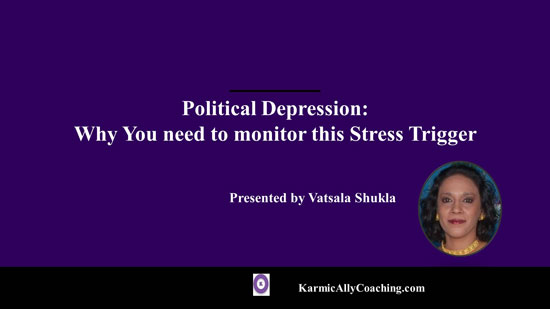
The subject of this video is Political Depression. I’m Vatsala Shukla from Karmic Ally Coaching and today I want to talk to you more about it and why you need to monitor this stress trigger.
Now, ‘Political Depression’ is a term which is increasingly being used to define the phenomena of the uncharted and intense feelings of helplessness, grief and anxiety in people which occurs due to distressing social and political events around them.
And to be honest, I didn’t know there was a term called Political Depression until late 2019 and early 2020 when there was a lot of social political unrest and turmoil, especially in New Delhi.
I started watching the news like a hawk because the route to the vet’s clinic for my pet Miss Coco crossed an area which was near to one of the universities where there was violence.
I didn’t have a chance to consider the actual issue or form my own view because I had a pet with a tumor to take care of which was already stressful.
And then the COVID-19 pandemic hit us and now I had all the time in the world to watch the news and scroll through social media seeing even more bad news.
These platforms constantly reported on politically sensitive matters, which then triggered an emotional response amongst those who consume content. Many of us discovered how divided we were in opinion.
I finally stopped engaging on social media because it was creating more stress than required. My mental health during times of uncertainty too became a top priority.
I’ve written more about this sudden lock-down and how to cope and maintain good mental health in this post.
In hindsight, it was timely action because the first half of 2021 saw the arrival of the second wave of COVID in India.
There was more devastation to deal with as the news became more personal with losing friends and people who made up our social circle.
Politics affects our Mental Health
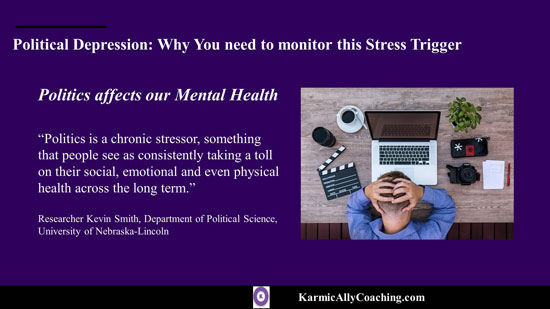
Now politics does affect our mental health as you can see in this quote. And I’m sure you’ve noticed that modern politics tend to be divisive. TV commentators and family members argue about impeachment, health care, and climate change.
However, you may not realize how much impact this stress can have on your personal health and relationships.
In this particular study, which is done by the University of Nebraska, Lincoln, they discovered that almost 40% of adults agreed that politics is causing them stress.
And accordingly, between 10% and 30% said that politics had damaged their friendships, made their home lives more unpleasant, and caused them to lose sleep or feel depressed.
This was also highlighted in another study by the American Psychological Association.
That study showed that the stress of following daily political news could negatively affect people’s mental health and well-being. One way to cope was to disengage but that had ramifications too.
To quote the study, “Protecting oneself from the stress of politics might help promote well-being but it also comes at a cost to staying engaged and active in democracy.”
Overall, the results suggested that politics has a significant daily effect on many Americans’ health and well-being. And even though the study population was American, I believe that the results hold for everyone.
And especially the implications, particularly for activists who wish to get people involved in advocating for political causes without harming their mental health, according to the researchers.
This trade-off between individual wellness and collective wellness can impact democracy as we know it.
While engaged citizens may be necessary for a democracy, it’s important to keep the affairs of state from interfering with your personal well-being.
So, with that in mind, I want to talk to you about some stress reducing suggestions for you to consider while consuming or discussing politics.
Some stress reducing suggestions to consider for consuming and discussing politics
Following the News with Less Stress
Now the first one is to take time off from actually listening to the news whether you’re in a car and the car’s radio is on while you’re driving you’re exposed to news even when you’re not searching for it. So, put a time limit on your own consumption and carry your headphones with you if you need a distraction, especially if you’re in a taxi.
Secondly set a curfew which means soothing bedtime rituals that will enhance your sleep. Turn off your computer and TV so you can read a novel or work on your hobby. In other words, don’t let your brain work too much.
Monitor the dinner talk. Food tastes so much more delicious when it’s accompanied by pleasant conversation. Discuss daily activities, happy memories, and vacation plans. Happy stuff.
Change the channel. Some news sources are grouchier than others. Pick a site with a calmer presentation. Watch programs that focus on facts rather than political positions or and scandals.
And the last one is to know your risks. Now you may be more vulnerable to political stress if you’re younger, or unemployed, and more politically active.
Research is still underway about what happens to voters when their party is out of office. You’ve seen how people behave when their football club’s lose matches. It’s something similar even with politics.
Discussing Politics with Less Stress
Also, when you do have to discuss politics try to make it less stressful.
One way is to be very civil. Listen to other points of view and respect someone’s opinions even when they differ from your own. Stick to the facts instead of taking issues personally.
Also, assume positive intentions. It’s so easy to stereotype someone on the opposite end of the political spectrum. Give them the benefit of the doubt and look for common ground. You may actually have similar goals even if you support different policies.
Clarify your purpose. Ask yourself why you’re having a particular conversation. If someone has strong beliefs, you’re unlikely to change their mind with anything you have to say.
And lastly, back off. You can decide to avoid debates that you find unproductive or disturbing. Tactfully change the subject or just walk away.
Here are some other Stress Reduction Tips
The first one which is important is to practice self-care. You’ll have more resilience to deal with any form of tension if you adopt habits that keep you strong and healthy. Eat a balanced diet, exercise regularly, and get at least 7 hours of sleep each night.
Then, build support. And that is nurturing relationships. That’s another effective tool for maintaining your peace of mind. Spend time with family and friends. Ask for help when you need it.
What about acting locally? You may feel more optimistic and empowered if you try to help your community. Campaign for local candidates or run for office yourself. Volunteer on your own or with your family for a cause you believe in.
And then, consider counseling. If political stress is interfering with your well-being and relationships, you may want to talk with a therapist. They can help you to gain insights into your situation and suggest coping strategies to provide relief.
To help you with controlling how you think, I’ve got a little gift for you
It’s my worksheet on controlling how you think, and your thoughts and you can download it for free at the link below this video. It will help you to cope with trying situations by changing your mind.
Final Words
So, my final words on this subject are, staying up to date with current events may help you to understand and influence public policy, as long as you keep your civic life in balance. I’d also suggest that you be selective and courteous about consuming news and discussing politics.
While it’s good to be socially aware it’s also good to be self-aware of what political discussions can do to trigger stress in you. And that’s from me; I’m Vatsala Shukla from Karmic Ally Coaching signing off. Bye for now.


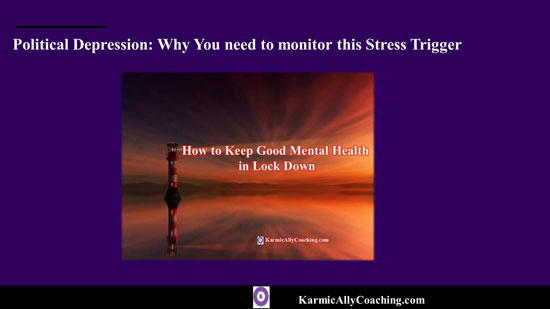
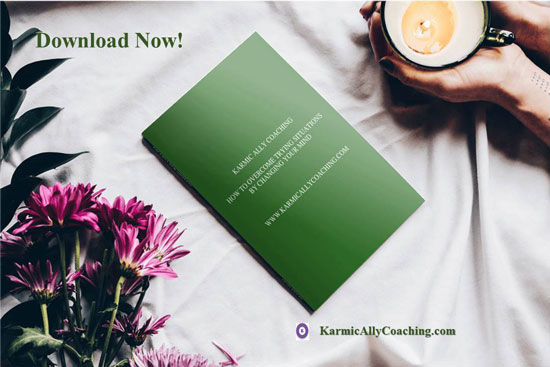
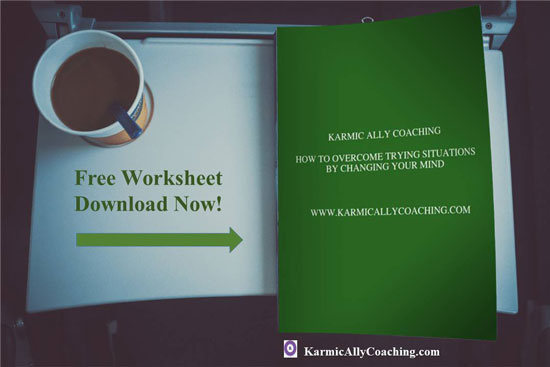
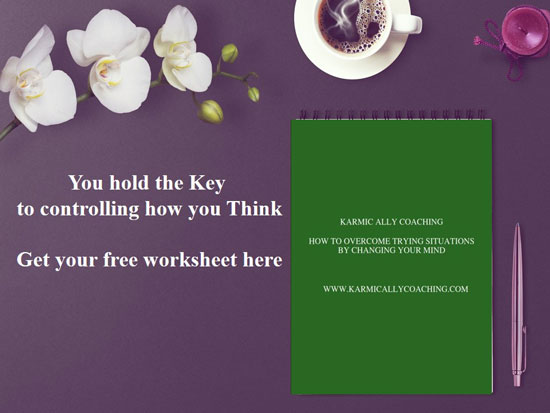

 I adhere to the Certified Coaches Alliance Code of Ethics and Standards. A copy is available on request.
I adhere to the Certified Coaches Alliance Code of Ethics and Standards. A copy is available on request.
 Let's Talk through the Connect Form:
Let's Talk through the Connect Form: